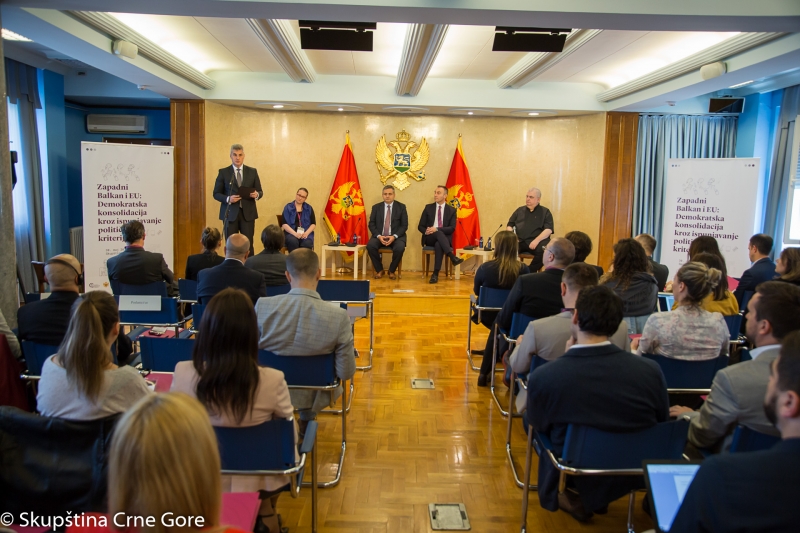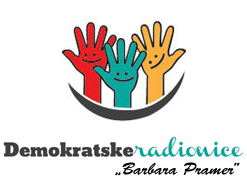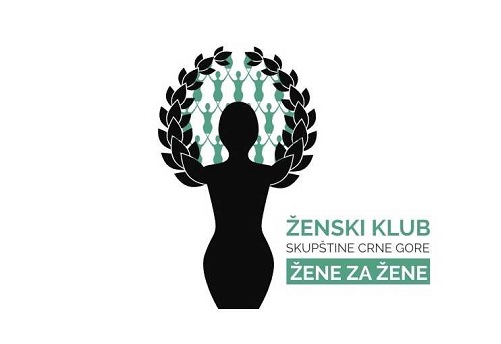The Conference “Western Balkans and the EU: Democratic consolidation through the fulfilment of political criteria” was held today at the Parliament of Montenegro, co-organised by the Montenegrin Parliament and the Center for Democratic Transition (CDT), under the auspices of the Balkan Trust for Democracy and the Embassy of the Kingdom of Norway.
The President of the Parliament of Montenegro, Mr Ivan Brajović, pointed out, while opening the Conference that the topic, which has been discussed that day, was a natural follow-up to the ongoing efforts of the Parliament to raise issues of significance, with partners from the country and abroad, primarily for our countries individually, as well as the future of the Western Balkans in the European Union. The integration into the European Union that has gathered us today - President Brajović said - is one of those processes that enjoys the greatest support of the citizens of Montenegro, over 60%, according to all surveys. This is the goal of program of all parliamentary parties of this convocation. This is the topic that a number of civil society organisations, academia and the media have been dealing with. And it is the responsibility of all of us involved in this process - President Brajović emphasised.
This is the institution of dialogue, but let me remind you that the dialogue involves at least two parties and a sincere intention to constructively respond to the challenges. As I believed that the colleagues from the opposition would be accountable to those who elected them and return to the Parliament to the voice in their stead, now I want to believe that, in light of the messages of the European Commission Report on Montenegro that was published yesterday, they would understand the importance of their role in the process of improving electoral legislation – said the President of the Parliament.
In the conclusion of the presentation, President Brajović pointed out that the European future of our countries individually and the Western Balkans, has gone beyond the framework of party and the interests of individual social groups, and that the Parliament of Montenegro contributed to the completion of that task in a committed and proper manner with this event.
The attendees were also welcomed by Mr Dragan Koprivica, Director Executive of the Center for Democratic Transition, Ms Gordana Delić, Director of the Balkan Trust for Democracy and Mr Geir Håkon Johansen, First Secretary at the Embassy of the Kingdom of Norway.
Within the first panel on the fulfilment of political criteria from the parliaments’ point of view, chairpersons of the committees dealing with European integration from the Parliament of Montenegro, the National Assembly of Serbia and the Assembly of Northern Macedonia Mr Slaven Radunović, Mr Nenad Čanak and Mr Artan Gruba spoke.
Within the second panel on the fulfilment of political criteria from the perspective of civil society, the following spoke: Ms Milica Kovačević (CDT, Montenegro), Mr Pavle Dimitrijević (CRTA, Serbia), Mr Bardhyl Jashari (Metamorphosis Foundation, North Macedonia), Ms Oana Popescu (Global Focus, Romania) and Mr Darko Brkan (UG Zašto ne?, B&H).
Besides the President Brajović, members of the ruling majority and the opposition of the Parliament of Montenegro, as well as guests from the non-governmental sector from the country and the region, took part in the discussion in both panels.
Summing up the main messages of the discussion, Mr Dragan Koprivica emphasised the need for much greater understanding between the European Union and the Western Balkans, both the countries individually and the whole region functioning as a system of communicating vessels where events in one country inevitably affect all of the other countries. The expectation of a greater focus of the European Union on the problems and needs of the Western Balkans has been emphasised, bearing in mind all the circumstances in decision making process and the possible consequences of untimely action. It was concluded that parliaments should consider the possibility of creating a special system of control over the fulfilment of political criteria of democratic consolidation on an integration path, the benefits of which could be stronger cooperation of competent committees with the non-governmental sector.
Guests from the country and abroad pointed out the openness of the Parliament of Montenegro for talks on issues of importance for the future of Montenegrin society and the entire region of the Western Balkans.
Speech of the President of the Parliament, Mr Ivan Brajović
Video coverage – Western Balkans and the EU democratic consolidation through the fulfilment of political criteria



















